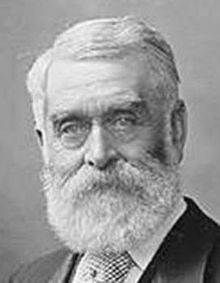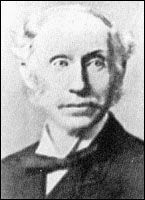Robert Thorburn
Sir Robert Thorburn KCMG (* 28. March 1836 in Juniper Bank , Walkerburn , Scotland ; † 12. April 1906 in St. John's , Newfoundland ) was a Canadian businessman and politician of the Reform Party, the 1885-1889 Prime Minister of the Crown Colony of Newfoundland was .
Life
Origin, member of the Legation Council and political views
Thorburn came from a Scottish family from the Glasgow - Greenock area who settled as merchants in Newfoundland at the end of the 18th century. After attending school in Edinburgh , he began to work for his uncles Walter Grieve and James Johnston Grieve in 1852 a company Baine, Johnston and Company . After his uncle Walter Grieve founded in 1855 under the name Walter Grieve and Company , which operated trading operations in Greenock and St. John's, Thorburn became its partner and agent in Newfoundland in 1862.
Thorburn began his political career in the late 1860s when he took part in a campaign against the Canadian Confederation at the behest of his uncle . In 1870 he was appointed a member of the Legislative Council, the then upper house of the Newfoundland Parliament, by the government of the Anti-Confederation Party under Prime Minister Charles Fox Bennett . He was also a senior member of the St. John's Chamber of Commerce , the General Water Company and other local companies, and was also a director of the Union Bank of Newfoundland . The candidatures offered to him for a seat in the House of Representatives of Newfoundland in the constituencies of St. John's in the elections in 1878 and 1882, however, he turned down each time.
Thorburn, whose political views were shaped by moderate, mercantile conservatism , questioned the benefit of building a transinsular railroad and a large dry dock in St. John's and vigorously rejected the growing anti-mercantile propaganda of Prime Minister William Vallance Whiteway 's administration. Like many of his fellow party members, he viewed the expansion of the French fishing industry in the Newfoundland Bank in the 1880s with dismay and believed that restrictions on the export of baitfish to foreign fishermen should limit it. Such views led to his involvement in the New Party , which was in opposition to Whiteway's politics.
Prime Minister 1885 to 1889
Whiteway's resignation, election victory in 1885 and tensions with the Catholics
In 1885 a political crisis developed in Harbor Grace after unrest between the Protestant Orange Order and Catholics . Subsequently, the Catholic Liberal Party gave up Whiteway's support, and a movement developed a united Protestant Party under the former Solicitor General James Spearman Winter . A merger of the political currents took place in October 1885, but presupposes that Whiteway resigned from his political offices and Winter gave up his claims to chair this new party.
The compromise candidate for the office of chairman of this reform party was then Thorburn, who on October 12, 1885 also took over the office of Prime Minister from Whiteway. In the election that followed, his reform party ran a virulent sectarian election campaign that refused to merge with the Catholics ("no amalgamation with the Roman Catholics") and focused on the Protestant Orange Order members. Behind this was a mercantile agenda that emphasized financial caution, attention to fishermen and an attack on French fishermen in the Newfoundland Bank through bait control. The election results largely followed sectarian boundaries, which earned the Reform Party a majority of four seats in the House of Representatives, with Thorburn himself being elected in the Trinity constituency.
Despite the anti-Catholic election slogans, Thorburn and other Reform Party politicians hoped to reach an agreement with the Catholic liberals led by Ambrose Shea . However, the government's rejection of the proposed appointment of Shea as governor of the Crown Colony led to the annoyance of the Catholics, so that Thorburn had to form a cabinet consisting entirely of Protestants.
Reconciliation with the Catholics and the economic crisis in 1886
Encouraged by the new Governor Sir George William Des Vœux , new negotiations began in the spring of 1886. The result was an agreement under which most of the Liberal members in the House of Representatives joined the Reform Party and the Catholics were given two cabinet posts on July 26, 1886, including Maurice Fenelon , who assumed the influential post of Colonial Secretary. However, the price the Liberals demanded had a significant impact on government policy.
In the winter session of 1886, the government resisted pressure from other parties to resume the construction of the railway, which had been stopped in 1884. On the other hand, Thorburn's government stressed the need for financial caution and rural development plans and passed the Bait Bill , with the UK government hesitant to approve. While the Liberals accepted the bait legislation, they called for other changes such as the construction of a railway to Placentia , the center of the Catholic district, and money for the sewer system in St. John's. The easing of spending was facilitated by a severe economic depression . After a poor catch quota in 1886, the government launched an extensive public works program. Similar expenses during the remainder of his tenure were paid in part by the colony's first foreign loan.
The bait law and relationship with Canada
During the first colonial conference in London in 1887 Thorburn received the hoped-for British approval of the Bait Act with the support of Shea and Des Vœux . While this was less important to the fishery than expected, it insulted the French and started a period of intense trouble with the French coast of Newfoundland. However, the bait law was also a concern of the Canadian government under Prime Minister John Macdonald . She was also concerned about Newfoundland's decision to sign an independent reciprocity with the United States .
As a result of these tensions, the question of joining the Canadian Confederation came back to the fore. At the suggestion of Alfred B. Morine , one from Nova Scotia originating journalist was in 1886 member of the House of Newfoundland, the Canadian finance minister visited Charles Tupper 1887 St. John's, who during a meeting with the Fisheries Commission in Washington, DC , the question of Union also discussed with James Spearman Winter, now Attorney General of the Thorburn government. Winter's attempt to convince the government to send a delegation to Canada broke the talks early on. Thorburn, who was promoted to Knight Commander of the Order of St. Michael and St. George in 1887 and henceforth the suffix "Sir", favored talks, but remained concerned about the effects of the Confederation on the economy of Newfoundland. His government was very divided on the question of the Confederation, was faced with broad-based opposition, and was ultimately only able to agree to the sending of a delegation without negotiating authority. However, this resulted in the Canadian government withdrawing its membership offer.
Election defeat in 1889
Before the 1889 elections it became clear that the Reform Party had failed to offer a credible alternative policy to that of Whiteway and its pro-railroad forces or to impress the electorate in any other way with a workable legislative policy. The Reform Party, challenged by a new Whiteway-led Liberal Party, began to work hastily to revive the railroad project and produced a list of promises to beat the opposition by their own means.
However, the ruling party was crushed. All cabinet members suffered electoral defeats and Prime Minister Thorburn himself came last in the field of constituency candidates in his constituency of Trinity . The defeat, however, was more blamed on professional politicians within the Reform Party like Winter than Thorburn, who was a less experienced politician and not the party's natural leader.
Exit from politics and collapse of his company

Thorburn, however, remained nominally chairman of the Reform Party, which later repositioned itself as the Tory Party. Before the elections scheduled for 1893, however, it became clear that his services were no longer needed. Unhappy about the rejection from his own party, he ran for the courting Liberal Party in the constituency of Bonavista , where he suffered another election defeat.
In addition, since the death of his uncle Walter Grieve in 1887, he concentrated on managing the company Walter Grieve and Company . In the following years he sold the business premises in Trinity, placed the seal hunting ships in a Limited Liability Company (LLC), and took over the remaining parts of the company in a new partnership with James F. Tessier. Founded in 1888, Thorburn and Tessier was briefly one of St. John's largest fish exporters. Ultimately, the company had to be transferred to Union Bank , of which he was Chairman of the Board. The Thorburn and Tessier Company merger was largely funded by Tessier, as Walter Grieve and Company had left no capital. Difficult trading conditions made it difficult for the company to repay its debt, which amounted to $ 473,000 in 1894 .
Last years of life
In 1894 he was appointed a member of the Legislative Council by Prime Minister Whiteway.
On December 10, 1894, Newfoundland's two main banks closed and Thorburn and Tessier was one of the many local businesses that had to cease operations. His company had an asset of $ 385,000. However, offers of 50 to 60 cents per US dollar were rejected, so that the company was wound up in 1897. Thorburn complained that the company was solvent and that it was being forced to give up by enemy trustees. The liberal press suspected that the liquidation was a punishment by the Tory Party for Thorburn's political change, especially since several other companies in similar condition survived the bank failure.
It was less likely that Thorburn suffered particularly from the economic crisis because he was facing charges as chairman of a bank. Indeed, criminal lawsuits have been initiated against him over the closure of Union Bank. This also meant that he had to resign as a member of the Legislative Council. After the proceedings against him were discontinued in 1897, he resumed his business activities on a smaller scale. He also wrote poetry for the local newspapers.
In 1900 he was appointed a member of the Fisheries Committee by the Liberal government under Prime Minister Robert Bond . Two years later, in 1902, he rejected a candidacy for a seat in the House of Representatives in a by-election .
Web links
| personal data | |
|---|---|
| SURNAME | Thorburn, Robert |
| BRIEF DESCRIPTION | Canadian entrepreneur and Prime Minister of the Crown Colony of Newfoundland |
| DATE OF BIRTH | March 28, 1836 |
| PLACE OF BIRTH | Juniper Bank , Walkerburn , Scotland |
| DATE OF DEATH | April 12, 1906 |
| Place of death | St. John's , Newfoundland |

